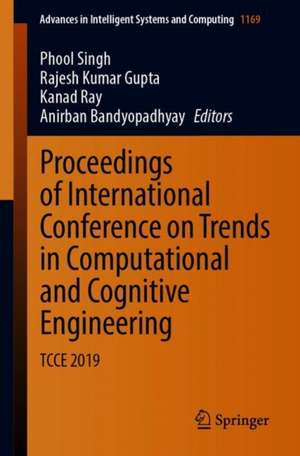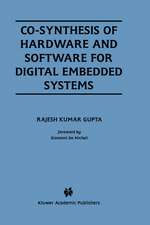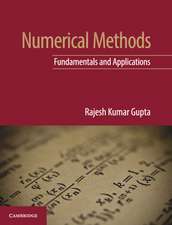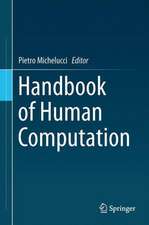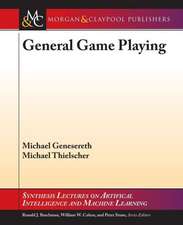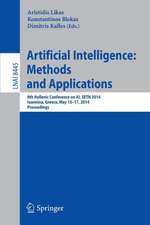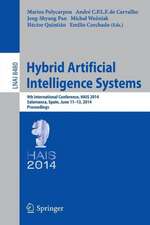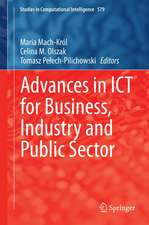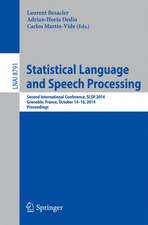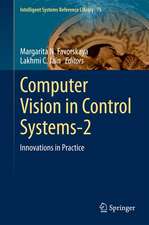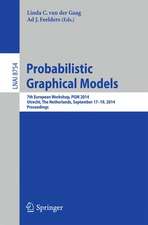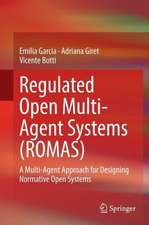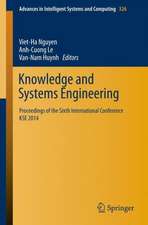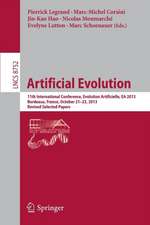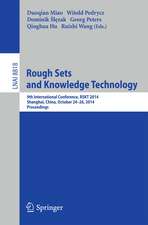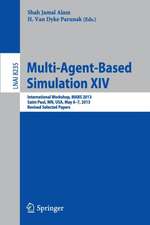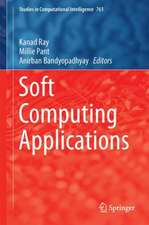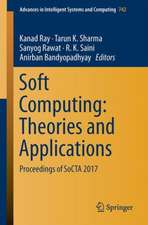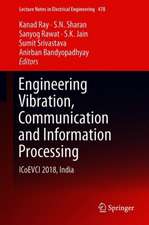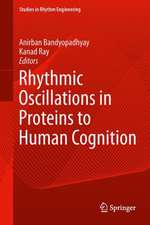Proceedings of International Conference on Trends in Computational and Cognitive Engineering: TCCE 2019: Advances in Intelligent Systems and Computing, cartea 1169
Editat de Phool Singh, Rajesh Kumar Gupta, Kanad Ray, Anirban Bandyopadhyayen Limba Engleză Paperback – oct 2020
This book presents various computational and cognitive modeling approaches in the areas of health, education, finance, theenvironment, engineering, commerce and industry. Gathering selected conference papers presented atthe International Conference on Trends in Computational and Cognitive Engineering (TCCE), it sharescutting-edge insights and ideas from mathematicians, engineers, scientists and researchers anddiscusses fresh perspectives on problem solving in a range of research areas.
Din seria Advances in Intelligent Systems and Computing
- 20%
 Preț: 1120.90 lei
Preț: 1120.90 lei - 20%
 Preț: 1090.59 lei
Preț: 1090.59 lei - 20%
 Preț: 1324.07 lei
Preț: 1324.07 lei - 20%
 Preț: 1989.79 lei
Preț: 1989.79 lei - 20%
 Preț: 1946.92 lei
Preț: 1946.92 lei - 18%
 Preț: 1273.28 lei
Preț: 1273.28 lei - 20%
 Preț: 2264.51 lei
Preț: 2264.51 lei - 20%
 Preț: 1337.27 lei
Preț: 1337.27 lei - 20%
 Preț: 1297.67 lei
Preț: 1297.67 lei - 20%
 Preț: 1315.82 lei
Preț: 1315.82 lei - 20%
 Preț: 1310.88 lei
Preț: 1310.88 lei - 20%
 Preț: 1302.62 lei
Preț: 1302.62 lei - 20%
 Preț: 882.20 lei
Preț: 882.20 lei - 20%
 Preț: 1305.93 lei
Preț: 1305.93 lei - 20%
 Preț: 1629.32 lei
Preț: 1629.32 lei - 20%
 Preț: 1345.49 lei
Preț: 1345.49 lei - 18%
 Preț: 1227.52 lei
Preț: 1227.52 lei - 18%
 Preț: 1290.64 lei
Preț: 1290.64 lei - 20%
 Preț: 1041.10 lei
Preț: 1041.10 lei - 20%
 Preț: 1034.52 lei
Preț: 1034.52 lei - 20%
 Preț: 1298.50 lei
Preț: 1298.50 lei - 20%
 Preț: 1330.67 lei
Preț: 1330.67 lei - 20%
 Preț: 1483.28 lei
Preț: 1483.28 lei - 20%
 Preț: 1971.64 lei
Preț: 1971.64 lei - 20%
 Preț: 1006.48 lei
Preț: 1006.48 lei - 20%
 Preț: 1471.75 lei
Preț: 1471.75 lei - 20%
 Preț: 1471.56 lei
Preț: 1471.56 lei - 20%
 Preț: 1454.40 lei
Preț: 1454.40 lei - 20%
 Preț: 1494.84 lei
Preț: 1494.84 lei - 20%
 Preț: 1269.64 lei
Preț: 1269.64 lei - 20%
 Preț: 1481.64 lei
Preț: 1481.64 lei - 20%
 Preț: 1192.08 lei
Preț: 1192.08 lei - 20%
 Preț: 1298.50 lei
Preț: 1298.50 lei - 20%
 Preț: 1489.07 lei
Preț: 1489.07 lei - 20%
 Preț: 825.78 lei
Preț: 825.78 lei - 20%
 Preț: 1649.93 lei
Preț: 1649.93 lei - 20%
 Preț: 1463.49 lei
Preț: 1463.49 lei - 20%
 Preț: 1438.77 lei
Preț: 1438.77 lei - 20%
 Preț: 1474.22 lei
Preț: 1474.22 lei - 20%
 Preț: 1298.50 lei
Preț: 1298.50 lei - 20%
 Preț: 1327.35 lei
Preț: 1327.35 lei - 20%
 Preț: 1973.31 lei
Preț: 1973.31 lei - 18%
 Preț: 947.04 lei
Preț: 947.04 lei - 18%
 Preț: 1441.39 lei
Preț: 1441.39 lei - 20%
 Preț: 638.55 lei
Preț: 638.55 lei - 20%
 Preț: 1320.76 lei
Preț: 1320.76 lei - 20%
 Preț: 1948.56 lei
Preț: 1948.56 lei
Preț: 991.46 lei
Preț vechi: 1239.33 lei
-20% Nou
Puncte Express: 1487
Preț estimativ în valută:
189.74€ • 197.36$ • 156.64£
189.74€ • 197.36$ • 156.64£
Carte tipărită la comandă
Livrare economică 14-28 aprilie
Preluare comenzi: 021 569.72.76
Specificații
ISBN-13: 9789811554131
ISBN-10: 9811554137
Ilustrații: XIII, 372 p. 210 illus., 85 illus. in color.
Dimensiuni: 155 x 235 mm
Greutate: 0.54 kg
Ediția:1st ed. 2021
Editura: Springer Nature Singapore
Colecția Springer
Seria Advances in Intelligent Systems and Computing
Locul publicării:Singapore, Singapore
ISBN-10: 9811554137
Ilustrații: XIII, 372 p. 210 illus., 85 illus. in color.
Dimensiuni: 155 x 235 mm
Greutate: 0.54 kg
Ediția:1st ed. 2021
Editura: Springer Nature Singapore
Colecția Springer
Seria Advances in Intelligent Systems and Computing
Locul publicării:Singapore, Singapore
Cuprins
Optical Chaotic Cryptosystem for Phase Images Using Random Amplitude and Phase Masks with Lorenz Map in Fresnel Domain.- Exact Series Solutions and Conservation Laws of Time Fractional Three Coupled KdV System.- Asymmetric Cryptosystem Using Structured Phase Masks in Discrete Cosine and Fractional Fourier Transforms.- Impact of Interchange of Coefficients on Various Fixed Point Iterative Schemes.- Quaternion, Octonion to Dodecanion Manifold: Stereographic Projections from Infinity Lead to a Self-Operating Mathematical Universe.- Biogeography Based Optimization (BBO) Trained Neural Networks for Wind Speed Forecasting.- Extended VIKOR-TODIM Approach Based on Entropy weight for Intuitionistic Fuzzy Sets.- A Novel Algorithm for Allocation of General Elective Subjects in Choice Based Credit System.- Mathematical Modeling of Carotid Artery with an Incompressible, Newtonian and Axisymmetric Flow.- On the Mild Solutions of Impulsive Semilinear Fractional Evolution Equations.
Notă biografică
Dr. Phool Singh received his Ph.D. in Mathematics from Banasthali University in the area of computational fluid dynamics and M.Phil., M.Sc. and B.Sc. from Maharshi Dayanand University, Rohtak. He has been working in Central University of Haryana as Associate Professor of Mathematics under the School of Engineering and Technology. Earlier, Dr Singh has served Avvaiyar Government College for Women, Karaikal, Puducherry, and The NorthCap University, Gurugram, as Assistant Professor of Mathematics. In 2006, he qualified CSIR-NET and GATE with all India rank 23. He is an active researcher and published more than 35 research papers in international journals of repute and edited two conference proceedings. He has diverse research interests encompassing optical image processing, computational neuroscience and computational fluid dynamics and promotes open-source softwares like Scilab, Octave, OpenFOAM, Python. He has also worked as principal investigator in a project (Parkinson’s disease) funded by Cognitive Science Research Initiative (CSRI-DST).
Dr Rajesh Kumar Gupta is an Associate Professor of Mathematics at Central University of Haryana and Central University of Punjab (on lien), India. He has more than 13 years of teaching and research experience. He has published 65 research papers in reputed international journals including 42 SCI listed papers with total impact factor more than 100. He has supervised 9 Ph.D. theses and 12 M.Sc. theses. He has been selected for prestigious UGC Research Award for the period 2016–18. He is principle investigator of two major research projects of worth approximately 33 lakhs, sponsored by CSIR and NBHM. His research interests revolve around the applications of symmetry analysis to nonlinear partial differential equations governing important physical phenomena. He has worked on several nonlinear systems including variable coefficients KdV, Boussinesq, BBM and Broer–Kaup equations, coupledHiggs field equation, Hamiltonian amplitude equation, coupled Klein–Gordon–Schrödinger and some highly nonlinear Einstein field equations.
Dr. Kanad Ray is a Professor and Head of the Department of Physics at the Amity School of Applied Sciences Physics Amity University Rajasthan (AUR), Jaipur, India. He has obtained M.Sc. & Ph.D. degrees in Physics from Calcutta University & Jadavpur University, West Bengal, India. In an academic career spanning over 22 years, he has published and presented research papers in several national and international journals and conferences in India and abroad. He has authored a book on the electromagnetic field theory. Prof. Ray’s current research areas of interest include cognition, communication, electromagnetic field theory, antenna & wave propagation, microwave, computational biology and applied physics. He has served as Editor of Springer Book Series such as AISC and LNEE. and an Associated Editor of Journal of Integrative Neuroscience published by IOS Press, Netherlands. He has established an MOU between his University and University of Montreal, Canada, for various joint research activities. He has also established MOU with National Institute for Materials Science (NIMS), Japan, for joint research activities and visits NIMS as a Visiting Scientist. He had been Visiting Professor to Universiti Teknologi Malaysia (UTM) and Universiti Teknikal Malaysia Melaka (UTeM), Malaysia. He had organized international conference series such as SoCTA, ICOEVCI as General Chair. He is a Senior Member, IEEE and an Executive Committee Member of IEEE Rajasthan. He has visited Netherlands, Turkey, China, Czechoslovakia, Russia, Portugal, Finland, Belgium, South Africa, Japan, Malaysia, Thailand, Singapore, etc., for various academic missions.
Dr. Anirban Bandyopadhyay is a Senior Scientist at the National Institute for Materials Science (NIMS), Tsukuba, Japan. He completed his Ph.D. in Supramolecular Electronics at the Indian Association for the Cultivation of Science (IACS), Kolkata, 2005. From 2005 to 2008, he was an independent researcher, as an ICYS Research Fellow at the International Center for Young Scientists (ICYS), NIMS, Japan, where he worked on the brain-like bio-processor building. In 2008, he joined as a Permanent Scientist at NIMS, working on the cavity resonator model of human brain and design synthesis of brain-like organic jelly. From 2013 to 2014, he was a Visiting Scientist at the Massachusetts Institute of Technology (MIT), USA. He has received several honors, such as the Hitachi Science and Technology award 2010, Inamori Foundation award 2011–2012, Kurata Foundation Award, Inamori Foundation Fellow (2011–), and Sewa Society International Member, Japan. He has patented ten inventions (i) a time crystal model for building an artificial human brain, (ii) geometric-musical language to operate a fractal tape to replace the Turing tape, (iii) fourth circuit element that is not memristor, (iii) cancer & alzheimers drug, (iv) nano-submarine as a working factory & nano-surgeon, (vi) fractal condensation-based synthesis, (vii) a thermal noise harvesting chip, (viii) a new generation of molecular rotor, (ix) spontaneous self-programmable synthesis (programmable matter) (x) fractal grid scanner for dielectric imaging. He has also designed and built multiple machines and technologies, (i) THz-magnetic nano-sensor, (ii) a new class of fusion resonator antenna, etc. Currently, he is building time crystal-based artificial brain using three ways, (i) knots of darkness made of fourth circuit element, (ii) integrated circuit design and (iii) organic supramolecular structure.
Textul de pe ultima copertă
This book presents various computational and cognitive modeling approaches in the areas of health, education, finance, theenvironment, engineering, commerce and industry. Gathering selected conference papers presented atthe International Conference on Trends in Computational and Cognitive Engineering (TCCE), it sharescutting-edge insights and ideas from mathematicians, engineers, scientists and researchers anddiscusses fresh perspectives on problem solving in a range of research areas.
Caracteristici
Presents most outstanding research papers presented at TCCE 2019 Discusses new findings in computational and cognitive engineering Serves as a reference for researchers and practitioners in academia and industry
